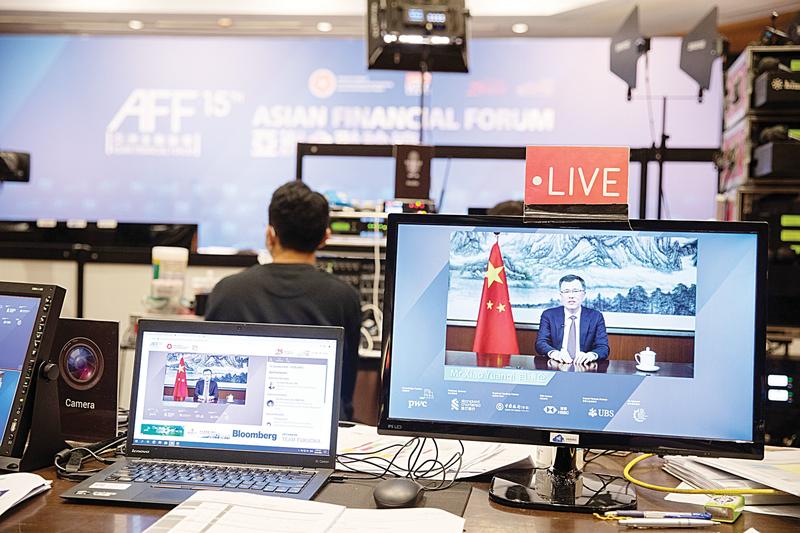 Xiao Yuanqi, vice-chairman of the China Banking and Insurance Regulatory Commission, on Monday, speaks at the opening session of the 15th Asian Financial Forum. (PHOTO PROVIDED TO CHINA DAILY)
Xiao Yuanqi, vice-chairman of the China Banking and Insurance Regulatory Commission, on Monday, speaks at the opening session of the 15th Asian Financial Forum. (PHOTO PROVIDED TO CHINA DAILY)
Two years into the COVID-19 pandemic, building the next normal with digitalization and a green economy is within our reach, yet closer global collaboration is vital for a sustainable future, policymakers said at the Asian Financial Forum on Monday.
Themed “Navigating the Next Normal towards a Sustainable Future”, the session was part of AFF 2022, held online by the Hong Kong Special Administrative Region government and the Hong Kong Trade Development Council.
Speaking at the forum via video recording, Hong Kong Secretary for Financial Services and the Treasury Christopher Hui Ching-yu said that the problems brought about by climate change need to be solved via joint efforts worldwide, adding that a resilient financial system is needed in Hong Kong to combat the uncertainties induced by the pandemic.
To achieve the city’s target of carbon neutrality by 2050, Hui said that a large amount of investment is needed to finance the green enterprises and projects, but that Hong Kong as a leading financial center, is well positioned to become a regional sustainable financial center.
Vincent Van Peteghem, Belgium’s deputy prime minister and minister of finance, said a green economic system requires global standards. “We need common global standards and definitions on the green finance in order to fully explore the potential of our global financial markets.”
“Even though governments are pouring a staggering amount of money to finance the green transition, we are aware that the flow of money is not endless, and it won’t be sufficient to fully finance the green transition,” he warned.
Climate change, as well as digitalization and healthcare are the three aspects to look into in the post-pandemic recovery, said Arkhom Termpittayapaisith, Thailand’s minister of finance, adding that the acceleration of digitalization amid the pandemic could reduce the operational cost of businesses and governments.
Looking toward the new normal, Muhammad Sulaiman Al Jasser, president of the Islamic Development Bank Group, noted that the world would see more uneven development, slower globalization and a higher digital transformation, which could pave the way for a sustainable development of the green economy.
The defining characteristics of the new normal also include stronger emerging economies such as China, India and Brazil, which will be bigger contributors to the global economy, said Marcos Troyjo, president of the New Development Bank, which is operated by the BRICS states — Brazil, Russia, India, China and South Africa.
“We should refute the fallacy that economic growth and green transition are an issue of either-or,” said Jin Liqun, president and chair of the Asian Infrastructure Investment Bank.
Shang Fulin, director of the Economic Affairs Committee of the Chinese People’s Political Consultative Conference, said in the AFF 2022’s keynote speech that the external environment is ever more complex and unstable amid the COVID-19 pandemic.
Xiao Yuanqi, vice-chairman of the China Banking and Insurance Regulatory Commission, said in a pre-recorded video that governments should strive to contain rising inflation and solve supply chain bottlenecks. They should also mull the timing and the size of exiting fiscal stimulus and quantitative easing policies.
Contact the writers at xinlanzeng@chinadailyhk.com


